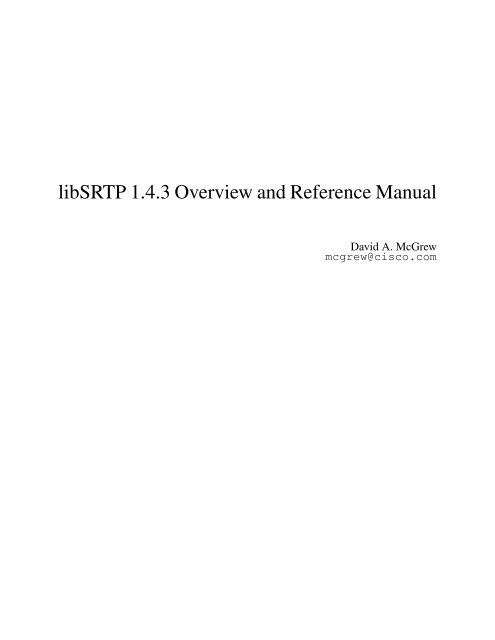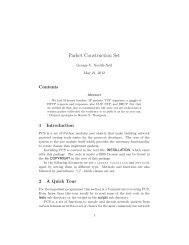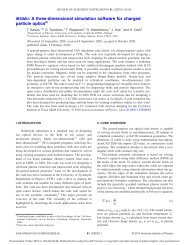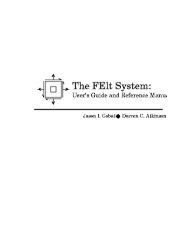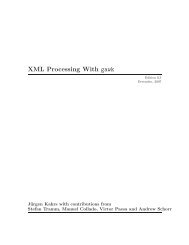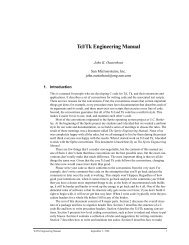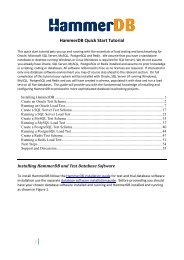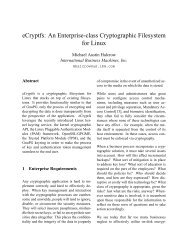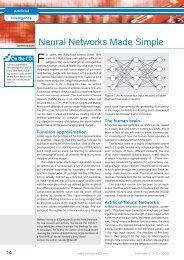libSRTP 1.4.3 Overview and Reference Manual - SourceForge
libSRTP 1.4.3 Overview and Reference Manual - SourceForge
libSRTP 1.4.3 Overview and Reference Manual - SourceForge
You also want an ePaper? Increase the reach of your titles
YUMPU automatically turns print PDFs into web optimized ePapers that Google loves.
<strong>libSRTP</strong> <strong>1.4.3</strong> <strong>Overview</strong> <strong>and</strong> <strong>Reference</strong> <strong>Manual</strong><br />
David A. McGrew<br />
mcgrew@cisco.com
Preface<br />
The original implementation <strong>and</strong> documentation of <strong>libSRTP</strong> was written by David McGrew of Cisco Systems, Inc. in<br />
order to promote the use, underst<strong>and</strong>ing, <strong>and</strong> interoperability of Secure RTP. Michael Jerris contributed support for<br />
building under MSVC. Andris Pavenis contributed many important fixes. Brian West contributed changes to enable<br />
dynamic linking. Yves Shumann reported documentation bugs. R<strong>and</strong>ell Jesup contributed a working SRTCP implementation<br />
<strong>and</strong> other fixes. Alex Vanzella <strong>and</strong> Will Clark contributed changes so that the AES ICM implementation can<br />
be used for ISMA media encryption. Steve Underwood contributed x86_64 portability changes. We also give thanks<br />
to Fredrik Thulin, Brian Weis, Mark Baugher, Jeff Chan, Bill Simon, Douglas Smith, Bill May, Richard Preistley, Joe<br />
Tardo <strong>and</strong> others for contributions, comments, <strong>and</strong> corrections.<br />
This reference material in this documenation was generated using the doxygen utility for automatic documentation<br />
of source code.<br />
©2001-2005 by David A. McGrew, Cisco Systems, Inc.
<strong>libSRTP</strong><br />
CONTENTS<br />
Contents<br />
1 Introduction to <strong>libSRTP</strong> 1<br />
1.1 License <strong>and</strong> Disclaimer . . . . . . . . . . . . . . . . . . . . . . . . . . . . . . . . . . . . . . . . . . 1<br />
1.2 Supported Features . . . . . . . . . . . . . . . . . . . . . . . . . . . . . . . . . . . . . . . . . . . . 2<br />
1.3 Installing <strong>and</strong> Building <strong>libSRTP</strong> . . . . . . . . . . . . . . . . . . . . . . . . . . . . . . . . . . . . . 3<br />
1.4 Applications . . . . . . . . . . . . . . . . . . . . . . . . . . . . . . . . . . . . . . . . . . . . . . . . 4<br />
1.5 Secure RTP Background . . . . . . . . . . . . . . . . . . . . . . . . . . . . . . . . . . . . . . . . . 5<br />
1.6 <strong>libSRTP</strong> <strong>Overview</strong> . . . . . . . . . . . . . . . . . . . . . . . . . . . . . . . . . . . . . . . . . . . . 6<br />
1.7 Example Code . . . . . . . . . . . . . . . . . . . . . . . . . . . . . . . . . . . . . . . . . . . . . . . 7<br />
1.8 ISMA Encryption Support . . . . . . . . . . . . . . . . . . . . . . . . . . . . . . . . . . . . . . . . 7<br />
2 <strong>libSRTP</strong> Module Index 9<br />
2.1 <strong>libSRTP</strong> Modules . . . . . . . . . . . . . . . . . . . . . . . . . . . . . . . . . . . . . . . . . . . . . 9<br />
3 <strong>libSRTP</strong> Directory Hierarchy 11<br />
3.1 <strong>libSRTP</strong> Directories . . . . . . . . . . . . . . . . . . . . . . . . . . . . . . . . . . . . . . . . . . . . 11<br />
i
<strong>libSRTP</strong><br />
CONTENTS<br />
4 <strong>libSRTP</strong> Data Structure Index 13<br />
4.1 <strong>libSRTP</strong> Data Structures . . . . . . . . . . . . . . . . . . . . . . . . . . . . . . . . . . . . . . . . . 13<br />
5 <strong>libSRTP</strong> Module Documentation 15<br />
5.1 Secure RTP . . . . . . . . . . . . . . . . . . . . . . . . . . . . . . . . . . . . . . . . . . . . . . . . 15<br />
5.2 Secure RTCP . . . . . . . . . . . . . . . . . . . . . . . . . . . . . . . . . . . . . . . . . . . . . . . 28<br />
5.3 SRTP events <strong>and</strong> callbacks . . . . . . . . . . . . . . . . . . . . . . . . . . . . . . . . . . . . . . . . 30<br />
5.4 Cryptographic Algorithms . . . . . . . . . . . . . . . . . . . . . . . . . . . . . . . . . . . . . . . . 33<br />
5.5 Cipher Types . . . . . . . . . . . . . . . . . . . . . . . . . . . . . . . . . . . . . . . . . . . . . . . 34<br />
5.6 Authentication Function Types . . . . . . . . . . . . . . . . . . . . . . . . . . . . . . . . . . . . . . 37<br />
5.7 Error Codes . . . . . . . . . . . . . . . . . . . . . . . . . . . . . . . . . . . . . . . . . . . . . . . . 39<br />
5.8 Cryptographic Kernel . . . . . . . . . . . . . . . . . . . . . . . . . . . . . . . . . . . . . . . . . . . 41<br />
5.9 Ciphers . . . . . . . . . . . . . . . . . . . . . . . . . . . . . . . . . . . . . . . . . . . . . . . . . . 42<br />
6 <strong>libSRTP</strong> Directory Documentation 45<br />
6.1 /Users/mcgrew/Code/july06/srtp/crypto/ Directory <strong>Reference</strong> . . . . . . . . . . . . . . . . . . . . . . 45<br />
6.2 /Users/mcgrew/Code/july06/srtp/include/ Directory <strong>Reference</strong> . . . . . . . . . . . . . . . . . . . . . 46<br />
6.3 /Users/mcgrew/Code/july06/srtp/crypto/include/ Directory <strong>Reference</strong> . . . . . . . . . . . . . . . . . 47<br />
7 <strong>libSRTP</strong> Data Structure Documentation 49<br />
7.1 crypto_policy_t Struct <strong>Reference</strong> . . . . . . . . . . . . . . . . . . . . . . . . . . . . . . . . . . . . . 49<br />
7.2 srtp_event_data_t Struct <strong>Reference</strong> . . . . . . . . . . . . . . . . . . . . . . . . . . . . . . . . . . . . 51<br />
7.3 srtp_policy_t Struct <strong>Reference</strong> . . . . . . . . . . . . . . . . . . . . . . . . . . . . . . . . . . . . . . 52<br />
ii
<strong>libSRTP</strong><br />
CONTENTS<br />
7.4 ssrc_t Struct <strong>Reference</strong> . . . . . . . . . . . . . . . . . . . . . . . . . . . . . . . . . . . . . . . . . . 54<br />
iii
<strong>libSRTP</strong><br />
Chapter 1<br />
Introduction to <strong>libSRTP</strong><br />
This document describes <strong>libSRTP</strong>, the Open Source Secure RTP library from Cisco Systems, Inc. RTP is the Real-time<br />
Transport Protocol, an IETF st<strong>and</strong>ard for the transport of real-time data such as telephony, audio, <strong>and</strong> video, defined<br />
by RFC1889. Secure RTP (SRTP) is an RTP profile for providing confidentiality to RTP data <strong>and</strong> authentication to the<br />
RTP header <strong>and</strong> payload. SRTP is an IETF Proposed St<strong>and</strong>ard, <strong>and</strong> is defined in RFC 3711, <strong>and</strong> was developed in the<br />
IETF Audio/Video Transport (AVT) Working Group. This library supports all of the m<strong>and</strong>atory features of SRTP, but<br />
not all of the optional features. See the Supported Features section for more detailed information.<br />
This document is organized as follows. The first chapter provides background material on SRTP <strong>and</strong> overview of<br />
<strong>libSRTP</strong>. The following chapters provide a detailed reference to the <strong>libSRTP</strong> API <strong>and</strong> related functions. The reference<br />
material is created automatically (using the doxygen utility) from comments embedded in some of the C header<br />
files. The documentation is organized into modules in order to improve its clarity. These modules do not directly<br />
correspond to files. An underlying cryptographic kernel provides much of the basic functionality of <strong>libSRTP</strong>, but is<br />
mostly undocumented because it does its work behind the scenes.<br />
1.1 License <strong>and</strong> Disclaimer<br />
<strong>libSRTP</strong> is distributed under the following license, which is included in the source code distribution. It is reproduced<br />
in the manual in case you got the library from another source.<br />
Copyright (c) 2001-2005 Cisco Systems, Inc. All rights reserved.<br />
Redistribution <strong>and</strong> use in source <strong>and</strong> binary forms, with or without modification, are permitted provided<br />
that the following conditions are met:<br />
1
<strong>libSRTP</strong><br />
1.2 Supported Features<br />
• Redistributions of source code must retain the above copyright notice, this list of conditions <strong>and</strong> the<br />
following disclaimer.<br />
• Redistributions in binary form must reproduce the above copyright notice, this list of conditions <strong>and</strong><br />
the following disclaimer in the documentation <strong>and</strong>/or other materials provided with the distribution.<br />
• Neither the name of the Cisco Systems, Inc. nor the names of its contributors may be used to endorse<br />
or promote products derived from this software without specific prior written permission.<br />
THIS SOFTWARE IS PROVIDED BY THE COPYRIGHT HOLDERS AND CONTRIBUTORS "AS IS"<br />
AND ANY EXPRESS OR IMPLIED WARRANTIES, INCLUDING, BUT NOT LIMITED TO, THE<br />
IMPLIED WARRANTIES OF MERCHANTABILITY AND FITNESS FOR A PARTICULAR PUR-<br />
POSE ARE DISCLAIMED. IN NO EVENT SHALL THE COPYRIGHT HOLDERS OR CONTRIB-<br />
UTORS BE LIABLE FOR ANY DIRECT, INDIRECT, INCIDENTAL, SPECIAL, EXEMPLARY, OR<br />
CONSEQUENTIAL DAMAGES (INCLUDING, BUT NOT LIMITED TO, PROCUREMENT OF SUB-<br />
STITUTE GOODS OR SERVICES; LOSS OF USE, DATA, OR PROFITS; OR BUSINESS INTERRUP-<br />
TION) HOWEVER CAUSED AND ON ANY THEORY OF LIABILITY, WHETHER IN CONTRACT,<br />
STRICT LIABILITY, OR TORT (INCLUDING NEGLIGENCE OR OTHERWISE) ARISING IN ANY<br />
WAY OUT OF THE USE OF THIS SOFTWARE, EVEN IF ADVISED OF THE POSSIBILITY OF<br />
SUCH DAMAGE.<br />
1.2 Supported Features<br />
This library supports all of the m<strong>and</strong>atory-to-implement features of SRTP (as defined by the most recent Internet<br />
Draft). Some of these features can be selected (or de-selected) at run time by setting an appropriate policy; this is done<br />
using the structure srtp_policy_t. Some other behaviors of the protocol can be adapted by defining an approriate event<br />
h<strong>and</strong>ler for the exceptional events; see the SRTP events <strong>and</strong> callbacks section.<br />
Some options that are not included in the specification are supported. Most notably, the TMMH authentication function<br />
is included, though it was removed from the SRTP Internet Draft during the summer of 2002.<br />
Some options that are described in the SRTP specification are not supported. This includes<br />
• the Master Key Index (MKI),<br />
• key derivation rates other than zero,<br />
• the cipher F8,<br />
• anti-replay lists with sizes other than 128,<br />
• the use of the packet index to select between master keys.<br />
The user should be aware that it is possible to misuse this libary, <strong>and</strong> that the result may be that the security level<br />
it provides is inadequate. If you are implementing a feature using this library, you will want to read the Security<br />
2
<strong>libSRTP</strong><br />
1.3 Installing <strong>and</strong> Building <strong>libSRTP</strong><br />
Considerations section of the Internet Draft. In addition, it is important that you read <strong>and</strong> underst<strong>and</strong> the terms<br />
outlined in the License <strong>and</strong> Disclaimer section.<br />
1.3 Installing <strong>and</strong> Building <strong>libSRTP</strong><br />
To install <strong>libSRTP</strong>, download the latest release of the distribution from srtp.sourceforge.net. The format of<br />
the names of the distributions are srtp-A.B.C.tgz, where A is the version number, B is the major release number,<br />
C is the minor release number, <strong>and</strong> tgz is the file extension 1 You probably want to get the most recent release. Unpack<br />
the distribution <strong>and</strong> extract the source files; the directory into which the soruce files will go is named srtp.<br />
<strong>libSRTP</strong> uses the GNU autoconf <strong>and</strong> make utilities 2 . In the srtp directory, run the configure script <strong>and</strong> then<br />
make:<br />
./configure [ options ]<br />
make<br />
The configure script accepts the following options:<br />
–help provides a usage summary.<br />
–disable-debug compiles <strong>libSRTP</strong> without the runtime dynamic debugging system.<br />
–enable-generic-aesicm compile in changes for ismacryp<br />
–enable-syslog use syslog for error reporting.<br />
–disable-stdout diables stdout for error reporting.<br />
–enable-console use /dev/console for error reporting<br />
–gdoi use GDOI key management (disabled at present).<br />
By default, dynamic debbuging is enabled <strong>and</strong> stdout is used for debugging. You can use the configure options to have<br />
the debugging output sent to syslog or the system console. Alternatively, you can define ERR_REPORTING_FILE in<br />
include/conf.h to be any other file that can be opened by <strong>libSRTP</strong>, <strong>and</strong> debug messages will be sent to it.<br />
This package has been tested on the following platforms: Mac OS X (powerpc-apple-darwin1.4), Cygwin (i686-<br />
pc-cygwin), Solaris (sparc-sun-solaris2.6), RedHat Linux 7.1 <strong>and</strong> 9 (i686-pc-linux), <strong>and</strong> OpenBSD (sparc-unknownopenbsd2.7).<br />
1 The extension .tgz is identical to tar.gz, <strong>and</strong> indicates a compressed tar file.<br />
2 BSD make will not work; if both versions of make are on your platform, you can invoke GNU make as gmake.<br />
3
1.4 Applications<br />
<strong>libSRTP</strong><br />
1.4 Applications<br />
Several test drivers <strong>and</strong> a simple <strong>and</strong> portable srtp application are included in the test/ subdirectory.<br />
Test driver<br />
kernel_driver<br />
srtp_driver<br />
rdbx_driver<br />
roc_driver<br />
replay_driver<br />
cipher_driver<br />
auth_driver<br />
Function tested<br />
crypto kernel (ciphers, auth funcs, rng)<br />
srtp in-memory tests (does not use the network)<br />
rdbx (extended replay database)<br />
extended sequence number functions<br />
replay database<br />
ciphers<br />
hash functions<br />
The app rtpw is a simple rtp application which reads words from /usr/dict/words <strong>and</strong> then sends them out one at a time<br />
using [s]rtp. <strong>Manual</strong> srtp keying uses the -k option; automated key management using gdoi will be added later.<br />
The usage for rtpw is<br />
rtpw [[-d ]* [-k [-a][-e]] [-s | -r] dest_ip dest_port][-l]<br />
Either the -s (sender) or -r (receiver) option must be chosen. The values dest_ip, dest_port are the IP address <strong>and</strong> UDP<br />
port to which the dictionary will be sent, respectively. The options are:<br />
-s (S)RTP sender - causes app to send words<br />
-r (S)RTP receive - causes app to receve words<br />
-k use SRTP master key , where the key is a hexadecimal value (without the leading "0x")<br />
-e encrypt/decrypt (for data confidentiality) (requires use of -k option as well)<br />
-a message authentication (requires use of -k option as well)<br />
-l list the avaliable debug modules<br />
-d turn on debugging for module <br />
In order to get a r<strong>and</strong>om 30-byte value for use as a key/salt pair, you can use the r<strong>and</strong>_gen utility in the test/<br />
subdirectory.<br />
An example of an SRTP session using two rtpw programs follows:<br />
[sh1] set k=‘test/r<strong>and</strong>_gen -n 30‘<br />
[sh1] echo $k<br />
c1eec3717da76195bb878578790af71c4ee9f859e197a414a78d5abc7451<br />
4
<strong>libSRTP</strong><br />
1.5 Secure RTP Background<br />
[sh1]$ test/rtpw -s -k $k -ea 0.0.0.0 9999<br />
Security services: confidentiality message authentication<br />
set master key/salt to C1EEC3717DA76195BB878578790AF71C/4EE9F859E197A414A78D5ABC7451<br />
setting SSRC to 2078917053<br />
sending word: A<br />
sending word: a<br />
sending word: aa<br />
sending word: aal<br />
sending word: aalii<br />
sending word: aam<br />
sending word: Aani<br />
sending word: aardvark<br />
...<br />
[sh2] set k=c1eec3717da76195bb878578790af71c4ee9f859e197a414a78d5abc7451<br />
[sh2]$ test/rtpw -r -k $k -ea 0.0.0.0 9999<br />
security services: confidentiality message authentication<br />
set master key/salt to C1EEC3717DA76195BB878578790AF71C/4EE9F859E197A414A78D5ABC7451<br />
19 octets received from SSRC 2078917053 word: A<br />
19 octets received from SSRC 2078917053 word: a<br />
20 octets received from SSRC 2078917053 word: aa<br />
21 octets received from SSRC 2078917053 word: aal<br />
...<br />
1.5 Secure RTP Background<br />
In this section we review SRTP <strong>and</strong> introduce some terms that are used in <strong>libSRTP</strong>. An RTP session is defined by a<br />
pair of destination transport addresses, that is, a network address plus a pair of UDP ports for RTP <strong>and</strong> RTCP. RTCP,<br />
the RTP control protocol, is used to coordinate between the participants in an RTP session, e.g. to provide feedback<br />
from receivers to senders. An SRTP session is similarly defined; it is just an RTP session for which the SRTP profile is<br />
being used. An SRTP session consists of the traffic sent to the SRTP or SRTCP destination transport addresses. Each<br />
participant in a session is identified by a synchronization source (SSRC) identifier. Some participants may not send<br />
any SRTP traffic; they are called receivers, even though they send out SRTCP traffic, such as receiver reports.<br />
RTP allows multiple sources to send RTP <strong>and</strong> RTCP traffic during the same session. The synchronization source<br />
identifier (SSRC) is used to distinguish these sources. In <strong>libSRTP</strong>, we call the SRTP <strong>and</strong> SRTCP traffic from a<br />
particular source a stream. Each stream has its own SSRC, sequence number, rollover counter, <strong>and</strong> other data. A<br />
particular choice of options, cryptographic mechanisms, <strong>and</strong> keys is called a policy. Each stream within a session can<br />
have a distinct policy applied to it. A session policy is a collection of stream policies.<br />
A single policy can be used for all of the streams in a given session, though the case in which a single key is shared<br />
across multiple streams requires care. When key sharing is used, the SSRC values that identify the streams must<br />
5
<strong>libSRTP</strong><br />
1.6 <strong>libSRTP</strong> <strong>Overview</strong><br />
be distinct. This requirement can be enforced by using the convention that each SRTP <strong>and</strong> SRTCP key is used for<br />
encryption by only a single sender. In other words, the key is shared only across streams that originate from a particular<br />
device (of course, other SRTP participants will need to use the key for decryption). <strong>libSRTP</strong> supports this enforcement<br />
by detecting the case in which a key is used for both inbound <strong>and</strong> outbound data.<br />
1.6 <strong>libSRTP</strong> <strong>Overview</strong><br />
<strong>libSRTP</strong> provides functions for protecting RTP <strong>and</strong> RTCP. RTP packets can be encrypted <strong>and</strong> authenticated (using the<br />
srtp_protect() function), turning them into SRTP packets. Similarly, SRTP packets can be decrypted <strong>and</strong> have their<br />
authentication verified (using the srtp_unprotect() function), turning them into RTP packets. Similar functions apply<br />
security to RTCP packets.<br />
The typedef srtp_stream_t points to a structure holding all of the state associated with an SRTP stream, including<br />
the keys <strong>and</strong> parameters for cipher <strong>and</strong> message authentication functions <strong>and</strong> the anti-replay data. A particular srtp_-<br />
stream_t holds the information needed to protect a particular RTP <strong>and</strong> RTCP stream. This datatype is intentionally<br />
opaque in order to better seperate the <strong>libSRTP</strong> API from its implementation.<br />
Within an SRTP session, there can be multiple streams, each originating from a particular sender. Each source uses<br />
a distinct stream context to protect the RTP <strong>and</strong> RTCP stream that it is originating. The typedef srtp_t points to a<br />
structure holding all of the state associated with an SRTP session. There can be multiple stream contexts associated<br />
with a single srtp_t. A stream context cannot exist indepent from an srtp_t, though of course an srtp_t can be created<br />
that contains only a single stream context. A device participating in an SRTP session must have a stream context for<br />
each source in that session, so that it can process the data that it receives from each sender.<br />
In <strong>libSRTP</strong>, a session is created using the function srtp_create(). The policy to be implemented in the session is passed<br />
into this function as an srtp_policy_t structure. A single one of these structures describes the policy of a single stream.<br />
These structures can also be linked together to form an entire session policy. A linked list of srtp_policy_t structures<br />
is equivalent to a session policy. In such a policy, we refer to a single srtp_policy_t as an element.<br />
An srtp_policy_t strucutre contains two crypto_policy_t structures that describe the cryptograhic policies for RTP <strong>and</strong><br />
RTCP, as well as the SRTP master key <strong>and</strong> the SSRC value. The SSRC describes what to protect (e.g. which stream),<br />
<strong>and</strong> the crypto_policy_t structures describe how to protect it. The key is contained in a policy element because it<br />
simplifies the interface to the library. In many cases, it is desirable to use the same cryptographic policies across all<br />
of the streams in a session, but to use a distinct key for each stream. A crypto_policy_t structure can be initialized<br />
by using either the crypto_policy_set_rtp_default() or crypto_policy_set_rtcp_default() functions, which set a crypto<br />
policy structure to the default policies for RTP <strong>and</strong> RTCP protection, respectively.<br />
6
<strong>libSRTP</strong><br />
1.7 Example Code<br />
1.7 Example Code<br />
This section provides a simple example of how to use <strong>libSRTP</strong>. The example code lacks error checking, but is functional.<br />
Here we assume that the value ssrc is already set to describe the SSRC of the stream that we are sending, <strong>and</strong><br />
that the functions get_rtp_packet() <strong>and</strong> send_srtp_packet() are available to us. The former puts an RTP packet into the<br />
buffer <strong>and</strong> returns the number of octets written to that buffer. The latter sends the RTP packet in the buffer, given the<br />
length as its second argument.<br />
srtp_t session;<br />
srtp_policy_t policy;<br />
uint8_t key[30];<br />
// initialize <strong>libSRTP</strong><br />
srtp_init();<br />
// set policy to describe a policy for an SRTP stream<br />
crypto_policy_set_rtp_default(&policy.rtp);<br />
crypto_policy_set_rtcp_default(&policy.rtcp);<br />
policy.ssrc = ssrc;<br />
policy.key = key;<br />
policy.next = NULL;<br />
// set key to r<strong>and</strong>om value<br />
crypto_get_r<strong>and</strong>om(key, 30);<br />
// allocate <strong>and</strong> initialize the SRTP session<br />
srtp_create(&session, policy);<br />
// main loop: get rtp packets, send srtp packets<br />
while (1) {<br />
char rtp_buffer[2048];<br />
unsigned len;<br />
}<br />
len = get_rtp_packet(rtp_buffer);<br />
srtp_protect(session, rtp_buffer, &len);<br />
send_srtp_packet(rtp_buffer, len);<br />
1.8 ISMA Encryption Support<br />
The Internet Streaming Media Alliance (ISMA) specifies a way to pre-encrypt a media file prior to streaming.<br />
This method is an alternative to SRTP encryption, which is potentially useful when a particular media file will be<br />
streamed multiple times. The specification is available online at http://www.isma.tv/specreq.nsf/Spec-<br />
Request.<br />
<strong>libSRTP</strong> provides the encryption <strong>and</strong> decryption functions needed for ISMAcryp in the library libaesicm.a,<br />
which is included in the default Makefile target. This library is used by the MPEG4IP project; see<br />
7
<strong>libSRTP</strong><br />
1.8 ISMA Encryption Support<br />
http://mpeg4ip.sourceforge.net/.<br />
Note that ISMAcryp does not provide authentication for RTP nor RTCP, nor confidentiality for RTCP. ISMAcryp<br />
RECOMMENDS the use of SRTP message authentication for ISMAcryp streams while using ISMAcryp encryption<br />
to protect the media itself.<br />
8
<strong>libSRTP</strong><br />
Chapter 2<br />
<strong>libSRTP</strong> Module Index<br />
2.1 <strong>libSRTP</strong> Modules<br />
Here is a list of all modules:<br />
Secure RTP . . . . . . . . . . . . . . . . . . . . . . . . . . . . . . . . . . . . . . . . . . . . . . . . . . . 15<br />
Secure RTCP . . . . . . . . . . . . . . . . . . . . . . . . . . . . . . . . . . . . . . . . . . . . . . . . 28<br />
SRTP events <strong>and</strong> callbacks . . . . . . . . . . . . . . . . . . . . . . . . . . . . . . . . . . . . . . . . . 30<br />
Cryptographic Algorithms . . . . . . . . . . . . . . . . . . . . . . . . . . . . . . . . . . . . . . . . . . . 33<br />
Cipher Types . . . . . . . . . . . . . . . . . . . . . . . . . . . . . . . . . . . . . . . . . . . . . . . . 34<br />
Authentication Function Types . . . . . . . . . . . . . . . . . . . . . . . . . . . . . . . . . . . . . . . . . 37<br />
Error Codes . . . . . . . . . . . . . . . . . . . . . . . . . . . . . . . . . . . . . . . . . . . . . . . . . . . 39<br />
Cryptographic Kernel . . . . . . . . . . . . . . . . . . . . . . . . . . . . . . . . . . . . . . . . . . . . . . 41<br />
Ciphers . . . . . . . . . . . . . . . . . . . . . . . . . . . . . . . . . . . . . . . . . . . . . . . . . . . 42<br />
9
<strong>libSRTP</strong><br />
2.1 <strong>libSRTP</strong> Modules<br />
10
<strong>libSRTP</strong><br />
Chapter 3<br />
<strong>libSRTP</strong> Directory Hierarchy<br />
3.1 <strong>libSRTP</strong> Directories<br />
This directory hierarchy is sorted roughly, but not completely, alphabetically:<br />
crypto . . . . . . . . . . . . . . . . . . . . . . . . . . . . . . . . . . . . . . . . . . . . . . . . . . . . . . 45<br />
include . . . . . . . . . . . . . . . . . . . . . . . . . . . . . . . . . . . . . . . . . . . . . . . . . . . . 47<br />
include . . . . . . . . . . . . . . . . . . . . . . . . . . . . . . . . . . . . . . . . . . . . . . . . . . . . . . 46<br />
11
<strong>libSRTP</strong><br />
3.1 <strong>libSRTP</strong> Directories<br />
12
<strong>libSRTP</strong><br />
Chapter 4<br />
<strong>libSRTP</strong> Data Structure Index<br />
4.1 <strong>libSRTP</strong> Data Structures<br />
Here are the data structures with brief descriptions:<br />
crypto_policy_t (Crypto_policy_t describes a particular crypto policy that can be applied to an SRTP stream ) 49<br />
srtp_event_data_t (Srtp_event_data_t is the structure passed as a callback to the event h<strong>and</strong>ler function ) . . 51<br />
srtp_policy_t (Policy for an SRTP session ) . . . . . . . . . . . . . . . . . . . . . . . . . . . . . . . . . . 52<br />
ssrc_t (An ssrc_t represents a particular SSRC value, or a ‘wildcard’ SSRC ) . . . . . . . . . . . . . . . . . 54<br />
13
<strong>libSRTP</strong><br />
4.1 <strong>libSRTP</strong> Data Structures<br />
14
<strong>libSRTP</strong><br />
Chapter 5<br />
<strong>libSRTP</strong> Module Documentation<br />
5.1 Secure RTP<br />
<strong>libSRTP</strong> provides functions for protecting RTP <strong>and</strong> RTCP. See Section <strong>libSRTP</strong> <strong>Overview</strong> for an introduction to the<br />
use of the library.<br />
Modules<br />
• Secure RTCP<br />
Secure RTCP functions are used to protect RTCP traffic.<br />
• SRTP events <strong>and</strong> callbacks<br />
<strong>libSRTP</strong> can use a user-provided callback function to h<strong>and</strong>le events.<br />
Data Structures<br />
• struct crypto_policy_t<br />
crypto_policy_t describes a particular crypto policy that can be applied to an SRTP stream.<br />
• struct ssrc_t<br />
An ssrc_t represents a particular SSRC value, or a ‘wildcard’ SSRC.<br />
15
<strong>libSRTP</strong><br />
5.1 Secure RTP<br />
• struct srtp_policy_t<br />
represents the policy for an SRTP session.<br />
Defines<br />
• #define SRTP_MAX_TRAILER_LEN SRTP_MAX_TAG_LEN<br />
the maximum number of octets added by srtp_protect().<br />
• #define crypto_policy_set_aes_cm_128_hmac_sha1_80(p) crypto_policy_set_rtp_default(p)<br />
crypto_policy_set_aes_cm_128_hmac_sha1_80() sets a crypto policy structure to the SRTP default policy for RTP protection.<br />
Typedefs<br />
• typedef crypto_policy_t crypto_policy_t<br />
crypto_policy_t describes a particular crypto policy that can be applied to an SRTP stream.<br />
• typedef srtp_policy_t srtp_policy_t<br />
represents the policy for an SRTP session.<br />
• typedef srtp_ctx_t ∗ srtp_t<br />
An srtp_t points to an SRTP session structure.<br />
• typedef srtp_stream_ctx_t ∗ srtp_stream_t<br />
An srtp_stream_t points to an SRTP stream structure.<br />
Enumerations<br />
• enum sec_serv_t { sec_serv_none = 0, sec_serv_conf = 1, sec_serv_auth = 2, sec_serv_conf_<strong>and</strong>_auth = 3 }<br />
sec_serv_t describes a set of security services.<br />
• enum ssrc_type_t { ssrc_undefined = 0, ssrc_specific = 1, ssrc_any_inbound = 2, ssrc_any_outbound = 3 }<br />
ssrc_type_t describes the type of an SSRC.<br />
16
<strong>libSRTP</strong><br />
Functions<br />
5.1 Secure RTP<br />
• err_status_t srtp_init (void)<br />
srtp_init() initializes the srtp library.<br />
• err_status_t srtp_protect (srtp_t ctx, void ∗rtp_hdr, int ∗len_ptr)<br />
srtp_protect() is the Secure RTP sender-side packet processing function.<br />
• err_status_t srtp_unprotect (srtp_t ctx, void ∗srtp_hdr, int ∗len_ptr)<br />
srtp_unprotect() is the Secure RTP receiver-side packet processing function.<br />
• err_status_t srtp_create (srtp_t ∗session, const srtp_policy_t ∗policy)<br />
srtp_create() allocates <strong>and</strong> initializes an SRTP session.<br />
• err_status_t srtp_add_stream (srtp_t session, const srtp_policy_t ∗policy)<br />
srtp_add_stream() allocates <strong>and</strong> initializes an SRTP stream within a given SRTP session.<br />
• err_status_t srtp_remove_stream (srtp_t session, uint32_t ssrc)<br />
srtp_remove_stream() deallocates an SRTP stream.<br />
• void crypto_policy_set_rtp_default (crypto_policy_t ∗p)<br />
crypto_policy_set_rtp_default() sets a crypto policy structure to the SRTP default policy for RTP protection.<br />
• void crypto_policy_set_rtcp_default (crypto_policy_t ∗p)<br />
crypto_policy_set_rtcp_default() sets a crypto policy structure to the SRTP default policy for RTCP protection.<br />
• void crypto_policy_set_aes_cm_128_hmac_sha1_32 (crypto_policy_t ∗p)<br />
crypto_policy_set_aes_cm_128_hmac_sha1_32() sets a crypto policy structure to a short-authentication tag policy<br />
• void crypto_policy_set_aes_cm_128_null_auth (crypto_policy_t ∗p)<br />
crypto_policy_set_aes_cm_128_null_auth() sets a crypto policy structure to an encryption-only policy<br />
• void crypto_policy_set_null_cipher_hmac_sha1_80 (crypto_policy_t ∗p)<br />
crypto_policy_set_null_cipher_hmac_sha1_80() sets a crypto policy structure to an authentication-only policy<br />
• err_status_t srtp_dealloc (srtp_t s)<br />
srtp_dealloc() deallocates storage for an SRTP session context.<br />
• err_status_t crypto_policy_set_from_profile_for_rtp (crypto_policy_t ∗policy, srtp_profile_t profile)<br />
crypto_policy_set_from_profile_for_rtp() sets a crypto policy structure to the appropriate value for RTP based on an<br />
srtp_profile_t<br />
• err_status_t crypto_policy_set_from_profile_for_rtcp (crypto_policy_t ∗policy, srtp_profile_t profile)<br />
17
<strong>libSRTP</strong><br />
5.1 Secure RTP<br />
crypto_policy_set_from_profile_for_rtcp() sets a crypto policy structure to the appropriate value for RTCP based on an<br />
srtp_profile_t<br />
• unsigned int srtp_profile_get_master_key_length (srtp_profile_t profile)<br />
returns the master key length for a given SRTP profile<br />
• unsigned int srtp_profile_get_master_salt_length (srtp_profile_t profile)<br />
returns the master salt length for a given SRTP profile<br />
• void append_salt_to_key (uint8_t ∗key, unsigned int bytes_in_key, uint8_t ∗salt, unsigned int bytes_in_salt)<br />
appends the salt to the key<br />
• err_status_t crypto_get_r<strong>and</strong>om (unsigned char ∗buffer, unsigned int length)<br />
writes a r<strong>and</strong>om octet string.<br />
5.1.1 Detailed Description<br />
5.1.2 Define Documentation<br />
5.1.2.1 #define crypto_policy_set_aes_cm_128_hmac_sha1_80(p) crypto_policy_set_rtp_default(p)<br />
Parameters:<br />
p is a pointer to the policy structure to be set<br />
The function crypto_policy_set_aes_cm_128_hmac_sha1_80() is a synonym for<br />
crypto_policy_set_rtp_default(). It conforms to the naming convention used in<br />
http://www.ietf.org/internet-drafts/draft-ietf-mmusic-sdescriptions-12.txt<br />
Returns:<br />
void.<br />
5.1.2.2 #define SRTP_MAX_TRAILER_LEN SRTP_MAX_TAG_LEN<br />
SRTP_MAX_TRAILER_LEN is the maximum length of the SRTP trailer (authentication tag <strong>and</strong> MKI) supported by<br />
<strong>libSRTP</strong>. This value is the maximum number of octets that will be added to an RTP packet by srtp_protect().<br />
18
<strong>libSRTP</strong><br />
5.1.3 Typedef Documentation<br />
5.1 Secure RTP<br />
5.1.3.1 typedef struct crypto_policy_t crypto_policy_t<br />
A crypto_policy_t describes a particular cryptographic policy that can be applied to an SRTP or SRTCP stream. An<br />
SRTP session policy consists of a list of these policies, one for each SRTP stream in the session.<br />
5.1.3.2 typedef struct srtp_policy_t srtp_policy_t<br />
A single srtp_policy_t struct represents the policy for a single SRTP stream, <strong>and</strong> a linked list of these elements represents<br />
the policy for an entire SRTP session. Each element contains the SRTP <strong>and</strong> SRTCP crypto policies for that<br />
stream, a pointer to the SRTP master key for that stream, the SSRC describing that stream, or a flag indicating a ‘wildcard’<br />
SSRC value, <strong>and</strong> a ‘next’ field that holds a pointer to the next element in the list of policy elements, or NULL if<br />
it is the last element.<br />
The wildcard value SSRC_ANY_INBOUND matches any SSRC from an inbound stream that for which there is no<br />
explicit SSRC entry in another policy element. Similarly, the value SSRC_ANY_OUTBOUND will matches any<br />
SSRC from an outbound stream that does not appear in another policy element. Note that wildcard SSRCs &b cannot<br />
be used to match both inbound <strong>and</strong> outbound traffic. This restriction is intentional, <strong>and</strong> it allows <strong>libSRTP</strong> to ensure<br />
that no security lapses result from accidental re-use of SSRC values during key sharing.<br />
Warning:<br />
The final element of the list must have its ‘next’ pointer set to NULL.<br />
5.1.3.3 typedef struct srtp_stream_ctx_t∗ srtp_stream_t<br />
The typedef srtp_stream_t is a pointer to a structure that represents an SRTP stream. This datatype is intentionally<br />
opaque in order to separate the interface from the implementation.<br />
An SRTP stream consists of all of the traffic sent to an SRTP session by a single participant. A session can be viewed<br />
as a set of streams.<br />
5.1.3.4 typedef struct srtp_ctx_t∗ srtp_t<br />
The typedef srtp_t is a pointer to a structure that represents an SRTP session. This datatype is intentially opaque in<br />
order to separate the interface from the implementation.<br />
19
<strong>libSRTP</strong><br />
5.1 Secure RTP<br />
An SRTP session consists of all of the traffic sent to the RTP <strong>and</strong> RTCP destination transport addresses, using the<br />
RTP/SAVP (Secure Audio/Video Profile). A session can be viewed as a set of SRTP streams, each of which originates<br />
with a different participant.<br />
5.1.4 Enumeration Type Documentation<br />
5.1.4.1 enum sec_serv_t<br />
A sec_serv_t enumeration is used to describe the particular security services that will be applied by a particular crypto<br />
policy (or other mechanism).<br />
Enumerator:<br />
sec_serv_none no services<br />
sec_serv_conf confidentiality<br />
sec_serv_auth authentication<br />
sec_serv_conf_<strong>and</strong>_auth confidentiality <strong>and</strong> authentication<br />
5.1.4.2 enum ssrc_type_t<br />
An ssrc_type_t enumeration is used to indicate a type of SSRC. See srtp_policy_t for more informataion.<br />
Enumerator:<br />
ssrc_undefined Indicates an undefined SSRC type.<br />
ssrc_specific Indicates a specific SSRC value<br />
ssrc_any_inbound Indicates any inbound SSRC value (i.e. a value that is used in the function srtp_unprotect())<br />
ssrc_any_outbound Indicates any outbound SSRC value (i.e. a value that is used in the function srtp_protect())<br />
5.1.5 Function Documentation<br />
5.1.5.1 void append_salt_to_key (uint8_t ∗ key, unsigned int bytes_in_key, uint8_t ∗ salt, unsigned int<br />
bytes_in_salt)<br />
The function call append_salt_to_key(k, klen, s, slen) copies the string s to the location at klen bytes following the<br />
location k.<br />
20
<strong>libSRTP</strong><br />
5.1 Secure RTP<br />
Warning:<br />
There must be at least bytes_in_salt + bytes_in_key bytes available at the location pointed to by key.<br />
5.1.5.2 err_status_t crypto_get_r<strong>and</strong>om (unsigned char ∗ buffer, unsigned int length)<br />
The function call crypto_get_r<strong>and</strong>om(dest, len) writes len octets of r<strong>and</strong>om data to the location to which dest points,<br />
<strong>and</strong> returns an error code. This error code must be checked, <strong>and</strong> if a failure is reported, the data in the buffer must not<br />
be used.<br />
Warning:<br />
If the return code is not checked, then non-r<strong>and</strong>om data may be in the buffer. This function will fail unless it is<br />
called after crypto_kernel_init().<br />
Returns:<br />
• err_status_ok if no problems occured.<br />
• [other] a problem occured, <strong>and</strong> no assumptions should be made about the contents of the destination buffer.<br />
5.1.5.3 void crypto_policy_set_aes_cm_128_hmac_sha1_32 (crypto_policy_t ∗ p)<br />
Parameters:<br />
p is a pointer to the policy structure to be set<br />
The function call crypto_policy_set_aes_cm_128_hmac_sha1_32(&p) sets the crypto_policy_t at location p to use<br />
policy AES_CM_128_HMAC_SHA1_32 as defined in draft-ietf-mmusic-sdescriptions-12.txt. This policy uses AES-<br />
128 Counter Mode encryption <strong>and</strong> HMAC-SHA1 authentication, with an authentication tag that is only 32 bits long.<br />
This length is considered adequate only for protecting audio <strong>and</strong> video media that use a stateless playback function.<br />
See Section 7.5 of RFC 3711 (http://www.ietf.org/rfc/rfc3711.txt).<br />
This function is a convenience that helps to avoid dealing directly with the policy data structure. You are encouraged<br />
to initialize policy elements with this function call. Doing so may allow your code to be forward compatible with later<br />
versions of <strong>libSRTP</strong> that include more elements in the crypto_policy_t datatype.<br />
Warning:<br />
This crypto policy is intended for use in SRTP, but not in SRTCP. It is recommended that a<br />
policy that uses longer authentication tags be used for SRTCP. See Section 7.5 of RFC 3711<br />
(http://www.ietf.org/rfc/rfc3711.txt).<br />
21
Returns:<br />
void.<br />
<strong>libSRTP</strong><br />
5.1 Secure RTP<br />
5.1.5.4 void crypto_policy_set_aes_cm_128_null_auth (crypto_policy_t ∗ p)<br />
Parameters:<br />
p is a pointer to the policy structure to be set<br />
The function call crypto_policy_set_aes_cm_128_null_auth(&p) sets the crypto_policy_t at location p to use the SRTP<br />
default cipher (AES-128 Counter Mode), but to use no authentication method. This policy is NOT RECOMMENDED<br />
unless it is unavoidable; see Section 7.5 of RFC 3711 (http://www.ietf.org/rfc/rfc3711.txt).<br />
This function is a convenience that helps to avoid dealing directly with the policy data structure. You are encouraged<br />
to initialize policy elements with this function call. Doing so may allow your code to be forward compatible with later<br />
versions of <strong>libSRTP</strong> that include more elements in the crypto_policy_t datatype.<br />
Warning:<br />
This policy is NOT RECOMMENDED for SRTP unless it is unavoidable, <strong>and</strong> it is NOT RECOMMENDED at<br />
all for SRTCP; see Section 7.5 of RFC 3711 (http://www.ietf.org/rfc/rfc3711.txt).<br />
Returns:<br />
void.<br />
5.1.5.5 err_status_t crypto_policy_set_from_profile_for_rtcp (crypto_policy_t ∗ policy, srtp_profile_t profile)<br />
Parameters:<br />
p is a pointer to the policy structure to be set<br />
The function call crypto_policy_set_rtcp_default(&policy, profile) sets the crypto_policy_t at location policy to the<br />
policy for RTCP protection, as defined by the srtp_profile_t profile.<br />
This function is a convenience that helps to avoid dealing directly with the policy data structure. You are encouraged<br />
to initialize policy elements with this function call. Doing so may allow your code to be forward compatible with later<br />
versions of <strong>libSRTP</strong> that include more elements in the crypto_policy_t datatype.<br />
Returns:<br />
values<br />
22
<strong>libSRTP</strong><br />
5.1 Secure RTP<br />
• err_status_ok no problems were encountered<br />
• err_status_bad_param the profile is not supported<br />
5.1.5.6 err_status_t crypto_policy_set_from_profile_for_rtp (crypto_policy_t ∗ policy, srtp_profile_t profile)<br />
Parameters:<br />
p is a pointer to the policy structure to be set<br />
The function call crypto_policy_set_rtp_default(&policy, profile) sets the crypto_policy_t at location policy to the<br />
policy for RTP protection, as defined by the srtp_profile_t profile.<br />
This function is a convenience that helps to avoid dealing directly with the policy data structure. You are encouraged<br />
to initialize policy elements with this function call. Doing so may allow your code to be forward compatible with later<br />
versions of <strong>libSRTP</strong> that include more elements in the crypto_policy_t datatype.<br />
Returns:<br />
values<br />
• err_status_ok no problems were encountered<br />
• err_status_bad_param the profile is not supported<br />
5.1.5.7 void crypto_policy_set_null_cipher_hmac_sha1_80 (crypto_policy_t ∗ p)<br />
Parameters:<br />
p is a pointer to the policy structure to be set<br />
The function call crypto_policy_set_null_cipher_hmac_sha1_80(&p) sets the crypto_policy_t at location p to use<br />
HMAC-SHA1 with an 80 bit authentication tag to provide message authentication, but to use no encryption. This<br />
policy is NOT RECOMMENDED for SRTP unless there is a requirement to forego encryption.<br />
This function is a convenience that helps to avoid dealing directly with the policy data structure. You are encouraged<br />
to initialize policy elements with this function call. Doing so may allow your code to be forward compatible with later<br />
versions of <strong>libSRTP</strong> that include more elements in the crypto_policy_t datatype.<br />
Warning:<br />
This policy is NOT RECOMMENDED for SRTP unless there is a requirement to forego encryption.<br />
23
Returns:<br />
void.<br />
<strong>libSRTP</strong><br />
5.1 Secure RTP<br />
5.1.5.8 void crypto_policy_set_rtcp_default (crypto_policy_t ∗ p)<br />
Parameters:<br />
p is a pointer to the policy structure to be set<br />
The function call crypto_policy_set_rtcp_default(&p) sets the crypto_policy_t at location p to the SRTP default policy<br />
for RTCP protection, as defined in the specification. This function is a convenience that helps to avoid dealing directly<br />
with the policy data structure. You are encouraged to initialize policy elements with this function call. Doing so may<br />
allow your code to be forward compatible with later versions of <strong>libSRTP</strong> that include more elements in the crypto_-<br />
policy_t datatype.<br />
Returns:<br />
void.<br />
5.1.5.9 void crypto_policy_set_rtp_default (crypto_policy_t ∗ p)<br />
Parameters:<br />
p is a pointer to the policy structure to be set<br />
The function call crypto_policy_set_rtp_default(&p) sets the crypto_policy_t at location p to the SRTP default policy<br />
for RTP protection, as defined in the specification. This function is a convenience that helps to avoid dealing directly<br />
with the policy data structure. You are encouraged to initialize policy elements with this function call. Doing so may<br />
allow your code to be forward compatible with later versions of <strong>libSRTP</strong> that include more elements in the crypto_-<br />
policy_t datatype.<br />
Returns:<br />
void.<br />
5.1.5.10 err_status_t srtp_add_stream (srtp_t session, const srtp_policy_t ∗ policy)<br />
The function call srtp_add_stream(session, policy) allocates <strong>and</strong> initializes a new SRTP stream within a given, previously<br />
created session, applying the policy given as the other argument to that stream.<br />
24
<strong>libSRTP</strong><br />
Returns:<br />
values:<br />
• err_status_ok if stream creation succeded.<br />
• err_status_alloc_fail if stream allocation failed<br />
• err_status_init_fail if stream initialization failed.<br />
5.1 Secure RTP<br />
5.1.5.11 err_status_t srtp_create (srtp_t ∗ session, const srtp_policy_t ∗ policy)<br />
The function call srtp_create(session, policy, key) allocates <strong>and</strong> initializes an SRTP session context, applying the given<br />
policy <strong>and</strong> key.<br />
Parameters:<br />
session is the SRTP session to which the policy is to be added.<br />
policy is the srtp_policy_t struct that describes the policy for the session. The struct may be a single element, or<br />
it may be the head of a list, in which case each element of the list is processed. It may also be NULL, in<br />
which case streams should be added later using srtp_add_stream(). The final element of the list must have<br />
its ‘next’ field set to NULL.<br />
Returns:<br />
• err_status_ok if creation succeded.<br />
• err_status_alloc_fail if allocation failed.<br />
• err_status_init_fail if initialization failed.<br />
5.1.5.12 err_status_t srtp_dealloc (srtp_t s)<br />
The function call srtp_dealloc(s) deallocates storage for the SRTP session context s. This function should be called no<br />
more than one time for each of the contexts allocated by the function srtp_create().<br />
Parameters:<br />
s is the srtp_t for the session to be deallocated.<br />
Returns:<br />
• err_status_ok if there no problems.<br />
• err_status_dealloc_fail a memory deallocation failure occured.<br />
25
<strong>libSRTP</strong><br />
5.1 Secure RTP<br />
5.1.5.13 err_status_t srtp_init (void)<br />
Warning:<br />
This function must be called before any other srtp functions.<br />
5.1.5.14 err_status_t srtp_protect (srtp_t ctx, void ∗ rtp_hdr, int ∗ len_ptr)<br />
The function call srtp_protect(ctx, rtp_hdr, len_ptr) applies SRTP protection to the RTP packet rtp_hdr (which has<br />
length ∗len_ptr) using the SRTP context ctx. If err_status_ok is returned, then rtp_hdr points to the resulting SRTP<br />
packet <strong>and</strong> ∗len_ptr is the number of octets in that packet; otherwise, no assumptions should be made about the value<br />
of either data elements.<br />
The sequence numbers of the RTP packets presented to this function need not be consecutive, but they must be out of<br />
order by less than 2 ∧ 15 = 32,768 packets.<br />
Warning:<br />
This function assumes that it can write the authentication tag into the location in memory immediately following<br />
the RTP packet, <strong>and</strong> assumes that the RTP packet is aligned on a 32-bit boundary.<br />
Parameters:<br />
ctx is the SRTP context to use in processing the packet.<br />
rtp_hdr is a pointer to the RTP packet (before the call); after the function returns, it points to the srtp packet.<br />
len_ptr is a pointer to the length in octets of the complete RTP packet (header <strong>and</strong> body) before the function call,<br />
<strong>and</strong> of the complete SRTP packet after the call, if err_status_ok was returned. Otherwise, the value of the<br />
data to which it points is undefined.<br />
Returns:<br />
• err_status_ok no problems<br />
• err_status_replay_fail rtp sequence number was non-increasing<br />
• other failure in cryptographic mechanisms<br />
5.1.5.15 err_status_t srtp_remove_stream (srtp_t session, uint32_t ssrc)<br />
The function call srtp_remove_stream(session, ssrc) removes the SRTP stream with the SSRC value ssrc from the<br />
SRTP session context given by the argument session.<br />
26
<strong>libSRTP</strong><br />
Parameters:<br />
session is the SRTP session from which the stream will be removed.<br />
ssrc is the SSRC value of the stream to be removed.<br />
5.1 Secure RTP<br />
Warning:<br />
Wildcard SSRC values cannot be removed from a session.<br />
Returns:<br />
• err_status_ok if the stream deallocation succeded.<br />
• [other] otherwise.<br />
5.1.5.16 err_status_t srtp_unprotect (srtp_t ctx, void ∗ srtp_hdr, int ∗ len_ptr)<br />
The function call srtp_unprotect(ctx, srtp_hdr, len_ptr) verifies the Secure RTP protection of the SRTP packet pointed<br />
to by srtp_hdr (which has length ∗len_ptr), using the SRTP context ctx. If err_status_ok is returned, then srtp_hdr<br />
points to the resulting RTP packet <strong>and</strong> ∗len_ptr is the number of octets in that packet; otherwise, no assumptions<br />
should be made about the value of either data elements.<br />
The sequence numbers of the RTP packets presented to this function need not be consecutive, but they must be out of<br />
order by less than 2 ∧ 15 = 32,768 packets.<br />
Warning:<br />
This function assumes that the SRTP packet is aligned on a 32-bit boundary.<br />
Parameters:<br />
ctx is a pointer to the srtp_t which applies to the particular packet.<br />
srtp_hdr is a pointer to the header of the SRTP packet (before the call). after the function returns, it points to the<br />
rtp packet if err_status_ok was returned; otherwise, the value of the data to which it points is undefined.<br />
len_ptr is a pointer to the length in octets of the complete srtp packet (header <strong>and</strong> body) before the function call,<br />
<strong>and</strong> of the complete rtp packet after the call, if err_status_ok was returned. Otherwise, the value of the data<br />
to which it points is undefined.<br />
Returns:<br />
• err_status_ok if the RTP packet is valid.<br />
• err_status_auth_fail if the SRTP packet failed the message authentication check.<br />
• err_status_replay_fail if the SRTP packet is a replay (e.g. packet has already been processed <strong>and</strong> accepted).<br />
• [other] if there has been an error in the cryptographic mechanisms.<br />
27
5.2 Secure RTCP<br />
<strong>libSRTP</strong><br />
5.2 Secure RTCP<br />
Secure RTCP functions are used to protect RTCP traffic.<br />
Functions<br />
• err_status_t srtp_protect_rtcp (srtp_t ctx, void ∗rtcp_hdr, int ∗pkt_octet_len)<br />
srtp_protect_rtcp() is the Secure RTCP sender-side packet processing function.<br />
• err_status_t srtp_unprotect_rtcp (srtp_t ctx, void ∗srtcp_hdr, int ∗pkt_octet_len)<br />
srtp_unprotect_rtcp() is the Secure RTCP receiver-side packet processing function.<br />
5.2.1 Detailed Description<br />
RTCP is the control protocol for RTP. <strong>libSRTP</strong> protects RTCP traffic in much the same way as it does RTP traffic. The<br />
function srtp_protect_rtcp() applies cryptographic protections to outbound RTCP packets, <strong>and</strong> srtp_unprotect_rtcp()<br />
verifies the protections on inbound RTCP packets.<br />
A note on the naming convention: srtp_protect_rtcp() has an srtp_t as its first argument, <strong>and</strong> thus has ‘srtp_’ as its<br />
prefix. The trailing ‘_rtcp’ indicates the protocol on which it acts.<br />
5.2.2 Function Documentation<br />
5.2.2.1 err_status_t srtp_protect_rtcp (srtp_t ctx, void ∗ rtcp_hdr, int ∗ pkt_octet_len)<br />
The function call srtp_protect_rtcp(ctx, rtp_hdr, len_ptr) applies SRTCP protection to the RTCP packet rtcp_hdr<br />
(which has length ∗len_ptr) using the SRTP session context ctx. If err_status_ok is returned, then rtp_hdr points<br />
to the resulting SRTCP packet <strong>and</strong> ∗len_ptr is the number of octets in that packet; otherwise, no assumptions should<br />
be made about the value of either data elements.<br />
Warning:<br />
This function assumes that it can write the authentication tag into the location in memory immediately following<br />
the RTCP packet, <strong>and</strong> assumes that the RTCP packet is aligned on a 32-bit boundary.<br />
28
<strong>libSRTP</strong><br />
Parameters:<br />
ctx is the SRTP context to use in processing the packet.<br />
5.2 Secure RTCP<br />
rtcp_hdr is a pointer to the RTCP packet (before the call); after the function returns, it points to the srtp packet.<br />
pkt_octet_len is a pointer to the length in octets of the complete RTCP packet (header <strong>and</strong> body) before the<br />
function call, <strong>and</strong> of the complete SRTCP packet after the call, if err_status_ok was returned. Otherwise, the<br />
value of the data to which it points is undefined.<br />
Returns:<br />
• err_status_ok if there were no problems.<br />
• [other] if there was a failure in the cryptographic mechanisms.<br />
5.2.2.2 err_status_t srtp_unprotect_rtcp (srtp_t ctx, void ∗ srtcp_hdr, int ∗ pkt_octet_len)<br />
The function call srtp_unprotect_rtcp(ctx, srtp_hdr, len_ptr) verifies the Secure RTCP protection of the SRTCP packet<br />
pointed to by srtcp_hdr (which has length ∗len_ptr), using the SRTP session context ctx. If err_status_ok is returned,<br />
then srtcp_hdr points to the resulting RTCP packet <strong>and</strong> ∗len_ptr is the number of octets in that packet; otherwise, no<br />
assumptions should be made about the value of either data elements.<br />
Warning:<br />
This function assumes that the SRTCP packet is aligned on a 32-bit boundary.<br />
Parameters:<br />
ctx is a pointer to the srtp_t which applies to the particular packet.<br />
srtcp_hdr is a pointer to the header of the SRTCP packet (before the call). After the function returns, it points to<br />
the rtp packet if err_status_ok was returned; otherwise, the value of the data to which it points is undefined.<br />
pkt_octet_len is a pointer to the length in octets of the complete SRTCP packet (header <strong>and</strong> body) before the<br />
function call, <strong>and</strong> of the complete rtp packet after the call, if err_status_ok was returned. Otherwise, the<br />
value of the data to which it points is undefined.<br />
Returns:<br />
• err_status_ok if the RTCP packet is valid.<br />
• err_status_auth_fail if the SRTCP packet failed the message authentication check.<br />
• err_status_replay_fail if the SRTCP packet is a replay (e.g. has already been processed <strong>and</strong> accepted).<br />
• [other] if there has been an error in the cryptographic mechanisms.<br />
29
<strong>libSRTP</strong><br />
5.3 SRTP events <strong>and</strong> callbacks<br />
5.3 SRTP events <strong>and</strong> callbacks<br />
<strong>libSRTP</strong> can use a user-provided callback function to h<strong>and</strong>le events.<br />
Data Structures<br />
• struct srtp_event_data_t<br />
srtp_event_data_t is the structure passed as a callback to the event h<strong>and</strong>ler function<br />
Typedefs<br />
• typedef srtp_event_data_t srtp_event_data_t<br />
srtp_event_data_t is the structure passed as a callback to the event h<strong>and</strong>ler function<br />
• typedef void( srtp_event_h<strong>and</strong>ler_func_t )(srtp_event_data_t ∗data)<br />
srtp_event_h<strong>and</strong>ler_func_t is the function prototype for the event h<strong>and</strong>ler.<br />
Enumerations<br />
• enum srtp_event_t { event_ssrc_collision, event_key_soft_limit, event_key_hard_limit, event_packet_index_-<br />
limit }<br />
srtp_event_t defines events that need to be h<strong>and</strong>led<br />
Functions<br />
• err_status_t srtp_install_event_h<strong>and</strong>ler (srtp_event_h<strong>and</strong>ler_func_t func)<br />
sets the event h<strong>and</strong>ler to the function supplied by the caller.<br />
30
<strong>libSRTP</strong><br />
5.3.1 Detailed Description<br />
5.3 SRTP events <strong>and</strong> callbacks<br />
<strong>libSRTP</strong> allows a user to provide a callback function to h<strong>and</strong>le events that need to be dealt with outside of the data plane<br />
(see the enum srtp_event_t for a description of these events). Dealing with these events is not a strict necessity; they<br />
are not security-critical, but the application may suffer if they are not h<strong>and</strong>led. The function srtp_set_event_h<strong>and</strong>ler()<br />
is used to provide the callback function.<br />
A default event h<strong>and</strong>ler that merely reports on the events as they happen is included. It is also possible to set the event<br />
h<strong>and</strong>ler function to NULL, in which case all events will just be silently ignored.<br />
5.3.2 Typedef Documentation<br />
5.3.2.1 typedef struct srtp_event_data_t srtp_event_data_t<br />
The struct srtp_event_data_t holds the data passed to the event h<strong>and</strong>ler function.<br />
5.3.2.2 typedef void( srtp_event_h<strong>and</strong>ler_func_t)(srtp_event_data_t ∗data)<br />
The typedef srtp_event_h<strong>and</strong>ler_func_t is the prototype for the event h<strong>and</strong>ler function. It has as its only argument an<br />
srtp_event_data_t which describes the event that needs to be h<strong>and</strong>led. There can only be a single, global h<strong>and</strong>ler for<br />
all events in <strong>libSRTP</strong>.<br />
5.3.3 Enumeration Type Documentation<br />
5.3.3.1 enum srtp_event_t<br />
The enum srtp_event_t defines events that need to be h<strong>and</strong>led outside the ‘data plane’, such as SSRC collisions <strong>and</strong><br />
key expirations.<br />
When a key expires or the maximum number of packets has been reached, an SRTP stream will enter an ‘expired’<br />
state in which no more packets can be protected or unprotected. When this happens, it is likely that you will want to<br />
either deallocate the stream (using srtp_stream_dealloc()), <strong>and</strong> possibly allocate a new one.<br />
When an SRTP stream expires, the other streams in the same session are unaffected, unless key sharing is used by that<br />
stream. In the latter case, all of the streams in the session will expire.<br />
31
<strong>libSRTP</strong><br />
Enumerator:<br />
event_ssrc_collision An SSRC collision occured.<br />
event_key_soft_limit An SRTP stream reached the soft key usage limit <strong>and</strong> will expire soon.<br />
event_key_hard_limit An SRTP stream reached the hard key usage limit <strong>and</strong> has expired.<br />
event_packet_index_limit An SRTP stream reached the hard packet limit (2 ∧ 48 packets).<br />
5.3 SRTP events <strong>and</strong> callbacks<br />
5.3.4 Function Documentation<br />
5.3.4.1 err_status_t srtp_install_event_h<strong>and</strong>ler (srtp_event_h<strong>and</strong>ler_func_t func)<br />
The function call srtp_install_event_h<strong>and</strong>ler(func) sets the event h<strong>and</strong>ler function to the value func. The value NULL<br />
is acceptable as an argument; in this case, events will be ignored rather than h<strong>and</strong>led.<br />
Parameters:<br />
func is a pointer to a fuction that takes an srtp_event_data_t pointer as an argument <strong>and</strong> returns void. This<br />
function will be used by <strong>libSRTP</strong> to h<strong>and</strong>le events.<br />
32
<strong>libSRTP</strong><br />
5.4 Cryptographic Algorithms<br />
5.4 Cryptographic Algorithms<br />
Modules<br />
• Cipher Types<br />
Each cipher type is identified by an unsigned integer. The cipher types available in this edition of <strong>libSRTP</strong> are given by<br />
the defines below.<br />
5.4.1 Detailed Description<br />
This library provides several different cryptographic algorithms, each of which can be selected by using the cipher_-<br />
type_id_t <strong>and</strong> auth_type_id_t. These algorithms are documented below.<br />
Authentication functions that use the Universal Security Transform (UST) must be used in conjunction with a cipher<br />
other than the null cipher. These functions require a per-message pseudor<strong>and</strong>om input that is generated by the cipher.<br />
The identifiers STRONGHOLD_AUTH <strong>and</strong> STRONGHOLD_CIPHER identify the strongest available authentication<br />
function <strong>and</strong> cipher, respectively. They are resolved at compile time to the strongest available algorithm. The<br />
stronghold algorithms can serve as did the keep of a medieval fortification; they provide the strongest defense (or the<br />
last refuge).<br />
33
5.5 Cipher Types<br />
<strong>libSRTP</strong><br />
5.5 Cipher Types<br />
Each cipher type is identified by an unsigned integer. The cipher types available in this edition of <strong>libSRTP</strong> are given<br />
by the defines below.<br />
Defines<br />
• #define NULL_CIPHER 0<br />
The null cipher performs no encryption.<br />
• #define AES_128_ICM 1<br />
AES-128 Integer Counter Mode (AES ICM).<br />
• #define SEAL 2<br />
SEAL 3.0.<br />
• #define AES_128_CBC 3<br />
AES-128 Integer Counter Mode (AES ICM).<br />
• #define STRONGHOLD_CIPHER AES_128_ICM<br />
Strongest available cipher.<br />
Typedefs<br />
• typedef uint32_t cipher_type_id_t<br />
A cipher_type_id_t is an identifier for a particular cipher type.<br />
5.5.1 Detailed Description<br />
A cipher_type_id_t is an identifier for a cipher_type; only values given by the defines above (or those present in the<br />
file crypto_types.h) should be used.<br />
The identifier STRONGHOLD_CIPHER indicates the strongest available cipher, allowing an application to choose<br />
the strongest available algorithm without any advance knowledge about the avaliable algorithms.<br />
34
<strong>libSRTP</strong><br />
5.5.2 Define Documentation<br />
5.5 Cipher Types<br />
5.5.2.1 #define AES_128_CBC 3<br />
AES-128 ICM is the variant of counter mode that is used by Secure RTP. This cipher uses a 16-octet key <strong>and</strong> a 30-octet<br />
offset (or salt) value.<br />
5.5.2.2 #define AES_128_ICM 1<br />
AES-128 ICM is the variant of counter mode that is used by Secure RTP. This cipher uses a 16-octet key <strong>and</strong> a 30-octet<br />
offset (or salt) value.<br />
5.5.2.3 #define NULL_CIPHER 0<br />
The NULL_CIPHER leaves its inputs unaltered, during both the encryption <strong>and</strong> decryption operations. This cipher<br />
can be chosen to indicate that no encryption is to be performed.<br />
5.5.2.4 #define SEAL 2<br />
SEAL is the Software-Optimized Encryption Algorithm of Coppersmith <strong>and</strong> Rogaway. Nota bene: this cipher is IBM<br />
proprietary.<br />
5.5.2.5 #define STRONGHOLD_CIPHER AES_128_ICM<br />
This identifier resolves to the strongest cipher type available.<br />
5.5.3 Typedef Documentation<br />
5.5.3.1 typedef uint32_t cipher_type_id_t<br />
A cipher_type_id_t is an integer that represents a particular cipher type, e.g. the Advanced Encryption St<strong>and</strong>ard<br />
(AES). A NULL_CIPHER is avaliable; this cipher leaves the data unchanged, <strong>and</strong> can be selected to indicate that no<br />
35
<strong>libSRTP</strong><br />
5.5 Cipher Types<br />
encryption is to take place.<br />
36
<strong>libSRTP</strong><br />
5.6 Authentication Function Types<br />
5.6 Authentication Function Types<br />
Each authentication function type is identified by an unsigned integer. The authentication function types available in<br />
this edition of <strong>libSRTP</strong> are given by the defines below.<br />
Defines<br />
• #define NULL_AUTH 0<br />
The null authentication function performs no authentication.<br />
• #define UST_TMMHv2 1<br />
UST with TMMH Version 2.<br />
• #define UST_AES_128_XMAC 2<br />
(UST) AES-128 XORMAC<br />
• #define HMAC_SHA1 3<br />
HMAC-SHA1.<br />
• #define STRONGHOLD_AUTH HMAC_SHA1<br />
Strongest available authentication function.<br />
Typedefs<br />
• typedef uint32_t auth_type_id_t<br />
An auth_type_id_t is an identifier for a particular authentication function.<br />
5.6.1 Detailed Description<br />
An auth_type_id_t is an identifier for an authentication function type; only values given by the defines above (or those<br />
present in the file crypto_types.h) should be used.<br />
The identifier STRONGHOLD_AUTH indicates the strongest available authentication function, allowing an application<br />
to choose the strongest available algorithm without any advance knowledge about the avaliable algorithms. The<br />
stronghold algorithms can serve as did the keep of a medieval fortification; they provide the strongest defense (or the<br />
last refuge).<br />
37
<strong>libSRTP</strong><br />
5.6.2 Define Documentation<br />
5.6 Authentication Function Types<br />
5.6.2.1 #define HMAC_SHA1 3<br />
HMAC_SHA1 implements the Hash-based MAC using the NIST Secure Hash Algorithm version 1 (SHA1).<br />
5.6.2.2 #define NULL_AUTH 0<br />
The NULL_AUTH function does nothing, <strong>and</strong> can be selected to indicate that authentication should not be performed.<br />
5.6.2.3 #define STRONGHOLD_AUTH HMAC_SHA1<br />
This identifier resolves to the strongest available authentication function.<br />
5.6.2.4 #define UST_AES_128_XMAC 2<br />
UST_AES_128_XMAC implements AES-128 XORMAC, using UST. Nota bene: the XORMAC algorithm is IBM<br />
proprietary.<br />
5.6.2.5 #define UST_TMMHv2 1<br />
UST_TMMHv2 implements the Truncated Multi-Modular Hash using UST. This function must be used in conjunction<br />
with a cipher other than the null cipher. with a cipher.<br />
5.6.3 Typedef Documentation<br />
5.6.3.1 typedef uint32_t auth_type_id_t<br />
An auth_type_id_t is an integer that represents a particular authentication function type, e.g. HMAC-SHA1. A<br />
NULL_AUTH is avaliable; this authentication function performs no computation, <strong>and</strong> can be selected to indicate<br />
that no authentication is to take place.<br />
38
<strong>libSRTP</strong><br />
5.7 Error Codes<br />
5.7 Error Codes<br />
Enumerations<br />
• enum err_status_t {<br />
err_status_ok = 0, err_status_fail = 1, err_status_bad_param = 2, err_status_alloc_fail = 3,<br />
err_status_dealloc_fail = 4, err_status_init_fail = 5, err_status_terminus = 6, err_status_auth_fail = 7,<br />
err_status_cipher_fail = 8, err_status_replay_fail = 9, err_status_replay_old = 10, err_status_algo_fail = 11,<br />
err_status_no_such_op = 12, err_status_no_ctx = 13, err_status_cant_check = 14, err_status_key_expired = 15,<br />
err_status_socket_err = 16, err_status_signal_err = 17, err_status_nonce_bad = 18, err_status_read_fail = 19,<br />
err_status_write_fail = 20, err_status_parse_err = 21, err_status_encode_err = 22, err_status_semaphore_err =<br />
23,<br />
err_status_pfkey_err = 24 }<br />
5.7.1 Detailed Description<br />
Error status codes are represented by the enumeration err_status_t.<br />
5.7.2 Enumeration Type Documentation<br />
5.7.2.1 enum err_status_t<br />
Enumerator:<br />
err_status_ok nothing to report<br />
err_status_fail unspecified failure<br />
err_status_bad_param unsupported parameter<br />
err_status_alloc_fail couldn’t allocate memory<br />
err_status_dealloc_fail couldn’t deallocate properly<br />
err_status_init_fail couldn’t initialize<br />
err_status_terminus can’t process as much data as requested<br />
err_status_auth_fail authentication failure<br />
err_status_cipher_fail cipher failure<br />
err_status_replay_fail replay check failed (bad index)<br />
err_status_replay_old replay check failed (index too old)<br />
39
<strong>libSRTP</strong><br />
5.7 Error Codes<br />
err_status_algo_fail algorithm failed test routine<br />
err_status_no_such_op unsupported operation<br />
err_status_no_ctx no appropriate context found<br />
err_status_cant_check unable to perform desired validation<br />
err_status_key_expired can’t use key any more<br />
err_status_socket_err error in use of socket<br />
err_status_signal_err error in use POSIX signals<br />
err_status_nonce_bad nonce check failed<br />
err_status_read_fail couldn’t read data<br />
err_status_write_fail couldn’t write data<br />
err_status_parse_err error pasring data<br />
err_status_encode_err error encoding data<br />
err_status_semaphore_err error while using semaphores<br />
err_status_pfkey_err error while using pfkey<br />
40
<strong>libSRTP</strong><br />
5.8 Cryptographic Kernel<br />
5.8 Cryptographic Kernel<br />
Modules<br />
• Ciphers<br />
A generic cipher type enables cipher agility, that is, the ability to write code that runs with multiple cipher types. Ciphers<br />
can be used through the crypto kernel, or can be accessed directly, if need be.<br />
5.8.1 Detailed Description<br />
All of the cryptographic functions are contained in a kernel.<br />
41
5.9 Ciphers<br />
<strong>libSRTP</strong><br />
5.9 Ciphers<br />
A generic cipher type enables cipher agility, that is, the ability to write code that runs with multiple cipher types.<br />
Ciphers can be used through the crypto kernel, or can be accessed directly, if need be.<br />
Functions<br />
• err_status_t cipher_type_alloc (cipher_type_t ∗ctype, cipher_t ∗∗cipher, unsigned key_len)<br />
Allocates a cipher of a particular type.<br />
• err_status_t cipher_init (cipher_t ∗cipher, const uint8_t ∗key)<br />
Initialized a cipher to use a particular key. May be invoked more than once on the same cipher.<br />
• err_status_t cipher_set_iv (cipher_t ∗cipher, void ∗iv)<br />
Sets the initialization vector of a given cipher.<br />
• err_status_t cipher_encrypt (cipher_t ∗cipher, void ∗buf, unsigned int ∗len)<br />
Encrypts a buffer with a given cipher.<br />
• err_status_t cipher_output (cipher_t ∗c, uint8_t ∗buffer, int num_octets_to_output)<br />
Sets a buffer to the keystream generated by the cipher.<br />
• err_status_t cipher_dealloc (cipher_t ∗cipher)<br />
Deallocates a cipher.<br />
5.9.1 Detailed Description<br />
5.9.2 Function Documentation<br />
5.9.2.1 err_status_t cipher_dealloc (cipher_t ∗ cipher)<br />
Warning:<br />
May be implemented as a macro.<br />
42
<strong>libSRTP</strong><br />
5.9 Ciphers<br />
5.9.2.2 err_status_t cipher_encrypt (cipher_t ∗ cipher, void ∗ buf, unsigned int ∗ len)<br />
Warning:<br />
May be implemented as a macro.<br />
5.9.2.3 err_status_t cipher_init (cipher_t ∗ cipher, const uint8_t ∗ key)<br />
Warning:<br />
May be implemented as a macro.<br />
5.9.2.4 err_status_t cipher_output (cipher_t ∗ c, uint8_t ∗ buffer, int num_octets_to_output)<br />
Warning:<br />
May be implemented as a macro.<br />
5.9.2.5 err_status_t cipher_set_iv (cipher_t ∗ cipher, void ∗ iv)<br />
Warning:<br />
May be implemented as a macro.<br />
5.9.2.6 err_status_t cipher_type_alloc (cipher_type_t ∗ ctype, cipher_t ∗∗ cipher, unsigned key_len)<br />
Warning:<br />
May be implemented as a macro.<br />
43
<strong>libSRTP</strong><br />
5.9 Ciphers<br />
44
<strong>libSRTP</strong><br />
Chapter 6<br />
<strong>libSRTP</strong> Directory Documentation<br />
6.1 /Users/mcgrew/Code/july06/srtp/crypto/ Directory <strong>Reference</strong><br />
Directories<br />
• directory include<br />
45
<strong>libSRTP</strong><br />
6.2 /Users/mcgrew/Code/july06/srtp/include/ Directory <strong>Reference</strong><br />
6.2 /Users/mcgrew/Code/july06/srtp/include/ Directory <strong>Reference</strong><br />
Files<br />
• file srtp.h<br />
46
<strong>libSRTP</strong><br />
6.3 /Users/mcgrew/Code/july06/srtp/crypto/include/ Directory <strong>Reference</strong><br />
6.3 /Users/mcgrew/Code/july06/srtp/crypto/include/ Directory <strong>Reference</strong><br />
Files<br />
• file crypto_kernel.h<br />
• file crypto_types.h<br />
• file err.h<br />
47
<strong>libSRTP</strong><br />
6.3 /Users/mcgrew/Code/july06/srtp/crypto/include/ Directory <strong>Reference</strong><br />
48
<strong>libSRTP</strong><br />
Chapter 7<br />
<strong>libSRTP</strong> Data Structure Documentation<br />
7.1 crypto_policy_t Struct <strong>Reference</strong><br />
crypto_policy_t describes a particular crypto policy that can be applied to an SRTP stream.<br />
Data Fields<br />
• cipher_type_id_t cipher_type<br />
• int cipher_key_len<br />
• auth_type_id_t auth_type<br />
• int auth_key_len<br />
• int auth_tag_len<br />
• sec_serv_t sec_serv<br />
7.1.1 Detailed Description<br />
A crypto_policy_t describes a particular cryptographic policy that can be applied to an SRTP or SRTCP stream. An<br />
SRTP session policy consists of a list of these policies, one for each SRTP stream in the session.<br />
49
<strong>libSRTP</strong><br />
7.1.2 Field Documentation<br />
7.1 crypto_policy_t Struct <strong>Reference</strong><br />
7.1.2.1 int crypto_policy_t::auth_key_len<br />
The length of the authentication function key in octets.<br />
7.1.2.2 int crypto_policy_t::auth_tag_len<br />
The length of the authentication tag in octets.<br />
7.1.2.3 auth_type_id_t crypto_policy_t::auth_type<br />
An integer representing the authentication function.<br />
7.1.2.4 int crypto_policy_t::cipher_key_len<br />
The length of the cipher key in octets.<br />
7.1.2.5 cipher_type_id_t crypto_policy_t::cipher_type<br />
An integer representing the type of cipher.<br />
7.1.2.6 sec_serv_t crypto_policy_t::sec_serv<br />
The flag indicating the security services to be applied.<br />
The documentation for this struct was generated from the following file:<br />
• srtp.h<br />
50
<strong>libSRTP</strong><br />
7.2 srtp_event_data_t Struct <strong>Reference</strong><br />
7.2 srtp_event_data_t Struct <strong>Reference</strong><br />
srtp_event_data_t is the structure passed as a callback to the event h<strong>and</strong>ler function<br />
Data Fields<br />
• srtp_t session<br />
• srtp_stream_t stream<br />
• srtp_event_t event<br />
7.2.1 Detailed Description<br />
The struct srtp_event_data_t holds the data passed to the event h<strong>and</strong>ler function.<br />
7.2.2 Field Documentation<br />
7.2.2.1 srtp_event_t srtp_event_data_t::event<br />
An enum indicating the type of event.<br />
7.2.2.2 srtp_t srtp_event_data_t::session<br />
The session in which the event happend.<br />
7.2.2.3 srtp_stream_t srtp_event_data_t::stream<br />
The stream in which the event happend.<br />
The documentation for this struct was generated from the following file:<br />
• srtp.h<br />
51
<strong>libSRTP</strong><br />
7.3 srtp_policy_t Struct <strong>Reference</strong><br />
7.3 srtp_policy_t Struct <strong>Reference</strong><br />
represents the policy for an SRTP session.<br />
Data Fields<br />
• ssrc_t ssrc<br />
• crypto_policy_t rtp<br />
• crypto_policy_t rtcp<br />
• uint8_t ∗ key<br />
• srtp_policy_t ∗ next<br />
7.3.1 Detailed Description<br />
A single srtp_policy_t struct represents the policy for a single SRTP stream, <strong>and</strong> a linked list of these elements represents<br />
the policy for an entire SRTP session. Each element contains the SRTP <strong>and</strong> SRTCP crypto policies for that<br />
stream, a pointer to the SRTP master key for that stream, the SSRC describing that stream, or a flag indicating a ‘wildcard’<br />
SSRC value, <strong>and</strong> a ‘next’ field that holds a pointer to the next element in the list of policy elements, or NULL if<br />
it is the last element.<br />
The wildcard value SSRC_ANY_INBOUND matches any SSRC from an inbound stream that for which there is no<br />
explicit SSRC entry in another policy element. Similarly, the value SSRC_ANY_OUTBOUND will matches any<br />
SSRC from an outbound stream that does not appear in another policy element. Note that wildcard SSRCs &b cannot<br />
be used to match both inbound <strong>and</strong> outbound traffic. This restriction is intentional, <strong>and</strong> it allows <strong>libSRTP</strong> to ensure<br />
that no security lapses result from accidental re-use of SSRC values during key sharing.<br />
Warning:<br />
The final element of the list must have its ‘next’ pointer set to NULL.<br />
7.3.2 Field Documentation<br />
7.3.2.1 uint8_t∗ srtp_policy_t::key<br />
Pointer to the SRTP master key for this stream.<br />
52
<strong>libSRTP</strong><br />
7.3 srtp_policy_t Struct <strong>Reference</strong><br />
7.3.2.2 struct srtp_policy_t∗ srtp_policy_t::next<br />
Pointer to next stream policy.<br />
7.3.2.3 crypto_policy_t srtp_policy_t::rtcp<br />
SRTCP crypto policy.<br />
7.3.2.4 crypto_policy_t srtp_policy_t::rtp<br />
SRTP crypto policy.<br />
7.3.2.5 ssrc_t srtp_policy_t::ssrc<br />
The SSRC value of stream, or the flags SSRC_ANY_INBOUND or SSRC_ANY_OUTBOUND if key sharing is used<br />
for this policy element.<br />
The documentation for this struct was generated from the following file:<br />
• srtp.h<br />
53
<strong>libSRTP</strong><br />
7.4 ssrc_t Struct <strong>Reference</strong><br />
7.4 ssrc_t Struct <strong>Reference</strong><br />
An ssrc_t represents a particular SSRC value, or a ‘wildcard’ SSRC.<br />
Data Fields<br />
• ssrc_type_t type<br />
• uint32_t value<br />
7.4.1 Detailed Description<br />
An ssrc_t represents a particular SSRC value (if its type is ssrc_specific), or a wildcard SSRC value that will match all<br />
outbound SSRCs (if its type is ssrc_any_outbound) or all inbound SSRCs (if its type is ssrc_any_inbound).<br />
7.4.2 Field Documentation<br />
7.4.2.1 ssrc_type_t ssrc_t::type<br />
The type of this particular SSRC<br />
7.4.2.2 uint32_t ssrc_t::value<br />
The value of this SSRC, if it is not a wildcard<br />
The documentation for this struct was generated from the following file:<br />
• srtp.h<br />
54
<strong>libSRTP</strong><br />
INDEX<br />
Index<br />
/Users/mcgrew/Code/july06/srtp/crypto/ Directory <strong>Reference</strong>,<br />
45<br />
/Users/mcgrew/Code/july06/srtp/crypto/include/ Directory<br />
<strong>Reference</strong>, 47<br />
/Users/mcgrew/Code/july06/srtp/include/ Directory <strong>Reference</strong>,<br />
46<br />
AES_128_CBC<br />
Ciphers, 35<br />
AES_128_ICM<br />
Ciphers, 35<br />
append_salt_to_key<br />
SRTP, 20<br />
auth_key_len<br />
crypto_policy_t, 50<br />
auth_tag_len<br />
crypto_policy_t, 50<br />
auth_type<br />
crypto_policy_t, 50<br />
auth_type_id_t<br />
Authentication, 38<br />
Authentication<br />
auth_type_id_t, 38<br />
HMAC_SHA1, 38<br />
NULL_AUTH, 38<br />
STRONGHOLD_AUTH, 38<br />
UST_AES_128_XMAC, 38<br />
UST_TMMHv2, 38<br />
Authentication Function Types, 37<br />
Cipher Types, 34<br />
cipher_dealloc<br />
CipherImplementations, 42<br />
cipher_encrypt<br />
CipherImplementations, 42<br />
cipher_init<br />
CipherImplementations, 43<br />
cipher_key_len<br />
crypto_policy_t, 50<br />
cipher_output<br />
CipherImplementations, 43<br />
cipher_set_iv<br />
CipherImplementations, 43<br />
cipher_type<br />
crypto_policy_t, 50<br />
cipher_type_alloc<br />
CipherImplementations, 43<br />
cipher_type_id_t<br />
Ciphers, 35<br />
CipherImplementations<br />
cipher_dealloc, 42<br />
cipher_encrypt, 42<br />
cipher_init, 43<br />
cipher_output, 43<br />
cipher_set_iv, 43<br />
cipher_type_alloc, 43<br />
Ciphers, 42<br />
AES_128_CBC, 35<br />
AES_128_ICM, 35<br />
cipher_type_id_t, 35<br />
NULL_CIPHER, 35<br />
SEAL, 35<br />
STRONGHOLD_CIPHER, 35<br />
crypto_get_r<strong>and</strong>om<br />
SRTP, 21<br />
crypto_policy_set_aes_cm_128_hmac_sha1_32<br />
SRTP, 21<br />
crypto_policy_set_aes_cm_128_hmac_sha1_80<br />
SRTP, 18<br />
crypto_policy_set_aes_cm_128_null_auth<br />
SRTP, 22<br />
crypto_policy_set_from_profile_for_rtcp<br />
SRTP, 22<br />
crypto_policy_set_from_profile_for_rtp<br />
55
<strong>libSRTP</strong><br />
INDEX<br />
SRTP, 23<br />
crypto_policy_set_null_cipher_hmac_sha1_80<br />
SRTP, 23<br />
crypto_policy_set_rtcp_default<br />
SRTP, 24<br />
crypto_policy_set_rtp_default<br />
SRTP, 24<br />
crypto_policy_t, 49<br />
auth_key_len, 50<br />
auth_tag_len, 50<br />
auth_type, 50<br />
cipher_key_len, 50<br />
cipher_type, 50<br />
sec_serv, 50<br />
SRTP, 19<br />
Cryptographic Algorithms, 33<br />
Cryptographic Kernel, 41<br />
err_status_algo_fail<br />
Error, 39<br />
err_status_alloc_fail<br />
Error, 39<br />
err_status_auth_fail<br />
Error, 39<br />
err_status_bad_param<br />
Error, 39<br />
err_status_cant_check<br />
Error, 40<br />
err_status_cipher_fail<br />
Error, 39<br />
err_status_dealloc_fail<br />
Error, 39<br />
err_status_encode_err<br />
Error, 40<br />
err_status_fail<br />
Error, 39<br />
err_status_init_fail<br />
Error, 39<br />
err_status_key_expired<br />
Error, 40<br />
err_status_no_ctx<br />
Error, 40<br />
err_status_no_such_op<br />
Error, 40<br />
err_status_nonce_bad<br />
Error, 40<br />
err_status_ok<br />
Error, 39<br />
err_status_parse_err<br />
Error, 40<br />
err_status_pfkey_err<br />
Error, 40<br />
err_status_read_fail<br />
Error, 40<br />
err_status_replay_fail<br />
Error, 39<br />
err_status_replay_old<br />
Error, 39<br />
err_status_semaphore_err<br />
Error, 40<br />
err_status_signal_err<br />
Error, 40<br />
err_status_socket_err<br />
Error, 40<br />
err_status_t<br />
Error, 39<br />
err_status_terminus<br />
Error, 39<br />
err_status_write_fail<br />
Error, 40<br />
Error<br />
err_status_algo_fail, 39<br />
err_status_alloc_fail, 39<br />
err_status_auth_fail, 39<br />
err_status_bad_param, 39<br />
err_status_cant_check, 40<br />
err_status_cipher_fail, 39<br />
err_status_dealloc_fail, 39<br />
err_status_encode_err, 40<br />
err_status_fail, 39<br />
err_status_init_fail, 39<br />
err_status_key_expired, 40<br />
err_status_no_ctx, 40<br />
err_status_no_such_op, 40<br />
err_status_nonce_bad, 40<br />
err_status_ok, 39<br />
err_status_parse_err, 40<br />
err_status_pfkey_err, 40<br />
err_status_read_fail, 40<br />
err_status_replay_fail, 39<br />
err_status_replay_old, 39<br />
err_status_semaphore_err, 40<br />
56
<strong>libSRTP</strong><br />
err_status_signal_err, 40<br />
err_status_socket_err, 40<br />
err_status_t, 39<br />
err_status_terminus, 39<br />
err_status_write_fail, 40<br />
Error Codes, 39<br />
event<br />
srtp_event_data_t, 51<br />
event_key_hard_limit<br />
SRTPevents, 32<br />
event_key_soft_limit<br />
SRTPevents, 32<br />
event_packet_index_limit<br />
SRTPevents, 32<br />
event_ssrc_collision<br />
SRTPevents, 32<br />
HMAC_SHA1<br />
Authentication, 38<br />
key<br />
srtp_policy_t, 52<br />
next<br />
srtp_policy_t, 52<br />
NULL_AUTH<br />
Authentication, 38<br />
NULL_CIPHER<br />
Ciphers, 35<br />
rtcp<br />
srtp_policy_t, 53<br />
rtp<br />
srtp_policy_t, 53<br />
SEAL<br />
Ciphers, 35<br />
sec_serv<br />
crypto_policy_t, 50<br />
sec_serv_auth<br />
SRTP, 20<br />
sec_serv_conf<br />
SRTP, 20<br />
sec_serv_conf_<strong>and</strong>_auth<br />
SRTP, 20<br />
sec_serv_none<br />
SRTP, 20<br />
INDEX<br />
sec_serv_t<br />
SRTP, 20<br />
Secure RTCP, 28<br />
Secure RTP, 15<br />
session<br />
srtp_event_data_t, 51<br />
SRTCP<br />
srtp_protect_rtcp, 28<br />
srtp_unprotect_rtcp, 29<br />
SRTP<br />
append_salt_to_key, 20<br />
crypto_get_r<strong>and</strong>om, 21<br />
crypto_policy_set_aes_cm_128_hmac_sha1_32, 21<br />
crypto_policy_set_aes_cm_128_hmac_sha1_80, 18<br />
crypto_policy_set_aes_cm_128_null_auth, 22<br />
crypto_policy_set_from_profile_for_rtcp, 22<br />
crypto_policy_set_from_profile_for_rtp, 23<br />
crypto_policy_set_null_cipher_hmac_sha1_80, 23<br />
crypto_policy_set_rtcp_default, 24<br />
crypto_policy_set_rtp_default, 24<br />
crypto_policy_t, 19<br />
sec_serv_auth, 20<br />
sec_serv_conf, 20<br />
sec_serv_conf_<strong>and</strong>_auth, 20<br />
sec_serv_none, 20<br />
sec_serv_t, 20<br />
srtp_add_stream, 24<br />
srtp_create, 25<br />
srtp_dealloc, 25<br />
srtp_init, 25<br />
SRTP_MAX_TRAILER_LEN, 18<br />
srtp_policy_t, 19<br />
srtp_protect, 26<br />
srtp_remove_stream, 26<br />
srtp_stream_t, 19<br />
srtp_t, 19<br />
srtp_unprotect, 27<br />
ssrc_any_inbound, 20<br />
ssrc_any_outbound, 20<br />
ssrc_specific, 20<br />
ssrc_type_t, 20<br />
ssrc_undefined, 20<br />
SRTP events <strong>and</strong> callbacks, 30<br />
srtp_add_stream<br />
SRTP, 24<br />
srtp_create<br />
57
<strong>libSRTP</strong><br />
INDEX<br />
SRTP, 25<br />
srtp_dealloc<br />
SRTP, 25<br />
srtp_event_data_t, 51<br />
event, 51<br />
session, 51<br />
SRTPevents, 31<br />
stream, 51<br />
srtp_event_h<strong>and</strong>ler_func_t<br />
SRTPevents, 31<br />
srtp_event_t<br />
SRTPevents, 31<br />
srtp_init<br />
SRTP, 25<br />
srtp_install_event_h<strong>and</strong>ler<br />
SRTPevents, 32<br />
SRTP_MAX_TRAILER_LEN<br />
SRTP, 18<br />
srtp_policy_t, 52<br />
key, 52<br />
next, 52<br />
rtcp, 53<br />
rtp, 53<br />
SRTP, 19<br />
ssrc, 53<br />
srtp_protect<br />
SRTP, 26<br />
srtp_protect_rtcp<br />
SRTCP, 28<br />
srtp_remove_stream<br />
SRTP, 26<br />
srtp_stream_t<br />
SRTP, 19<br />
srtp_t<br />
SRTP, 19<br />
srtp_unprotect<br />
SRTP, 27<br />
srtp_unprotect_rtcp<br />
SRTCP, 29<br />
SRTPevents<br />
event_key_hard_limit, 32<br />
event_key_soft_limit, 32<br />
event_packet_index_limit, 32<br />
event_ssrc_collision, 32<br />
srtp_event_data_t, 31<br />
srtp_event_h<strong>and</strong>ler_func_t, 31<br />
srtp_event_t, 31<br />
srtp_install_event_h<strong>and</strong>ler, 32<br />
ssrc<br />
srtp_policy_t, 53<br />
ssrc_any_inbound<br />
SRTP, 20<br />
ssrc_any_outbound<br />
SRTP, 20<br />
ssrc_specific<br />
SRTP, 20<br />
ssrc_t, 54<br />
type, 54<br />
value, 54<br />
ssrc_type_t<br />
SRTP, 20<br />
ssrc_undefined<br />
SRTP, 20<br />
stream<br />
srtp_event_data_t, 51<br />
STRONGHOLD_AUTH<br />
Authentication, 38<br />
STRONGHOLD_CIPHER<br />
Ciphers, 35<br />
type<br />
ssrc_t, 54<br />
UST_AES_128_XMAC<br />
Authentication, 38<br />
UST_TMMHv2<br />
Authentication, 38<br />
value<br />
ssrc_t, 54<br />
58


